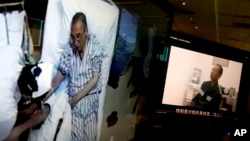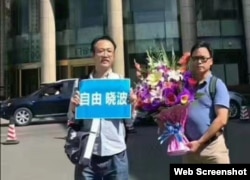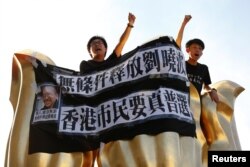The health of China's lone Nobel laureate, the dissident Liu Xiaobo, has dramatically deteriorated, according to the hospital treating him for liver cancer in Shenyang, China.
Doctors at China Medical University No. 1 Hospital released a statement Thursday, saying that they suspect Liu has a blood clot in one of his calf muscles and that his liver functioning "has deteriorated."
Liu, 61, was sentenced to 11 years in prison in 2009 for co-writing and distributing Charter 08, a petition that called for liberal reforms in mainland China. Accused of "inciting subversion of state power," the scholar of Chinese literature and philosophy was placed in a remote prison in northeast China, while his wife, the poet Liu Xia, was put under house arrest in Beijing, despite never being charged with a crime.
Earlier Thursday, Chinese authorities invited doctors from Germany and the United States to visit Shenyang and help treat Liu. Some, including the rights group Amnesty International, view the concession as an attempt by the Chinese Communist Party to sideline the issue ahead of the weekend's G-20 summit in Hamburg, Germany, where President Xi Jinping hopes to project global leadership on issues like climate change and free trade.
Although China released Liu from prison to seek medical care in June, authorities have denied him permission to search for better treatment elsewhere, insisting that he is being tended to by the nation's pre-eminent liver cancer specialists. That decision has drawn growing condemnation.
Last week, a letter signed by more than 50 fellow writers, including Martin Amis, Margaret Atwood, and Philip Roth, asked President Xi to "ensure [Liu's] unrestricted freedom as he undergoes medical treatment," and to "show him compassion." On Thursday, the European Parliament passed a resolution urging China to "immediately release the 2010 Nobel Peace Prize winner ... and allow him to seek medical treatment wherever he wishes."
China's foreign ministry spokesman Geng Shuang told AFP that outsiders should "refrain from interfering in China's judicial sovereignty under the pretext of the individual cases."
Hu Jia, a friend of Liu, told AFP that Chinese authorities want to keep the dissident muzzled in the country, unable to criticize the party.
"They want to delay things until he can no longer express himself," Hu said. "Their greatest fear is that he'll speak."
Liu has grown into a ubiquitous symbol for the resistance to Communist Party rule. As Hong Kong celebrated the 20-year anniversary of its handoff from Britain to China, student protesters draped a banner that read "We do not want Xi Jinping. We want Liu Xiaobo" over a monument and continued to shout his name as they were hauled off into police vans. Thousands of Hong Kong citizens marched for liberal reforms, some of them carrying placards emblazoned with Liu's face.
The professor first drew the Communist Party's ire in 1989. He was teaching in America at Barnard College when student protests began in Tiananmen Square. He rushed back to China and stayed in the park for several days, later helping negotiate the safe exit of demonstrators when the military invoked martial law. He was sentenced to two years in prison.
He emerged, continuing to write politically charged essays like "Changing the Regime by Changing Society," a 2006 piece that was cited during his 2009 trial as evidence of Liu's counter-revolutionary ideals.
"China has entered an Age of Cynicism in which people no longer believe in anything," he wrote. "Unrelenting inculcation of Chinese Communist Party ideology has ... produced generations of people whose memories are blank."







